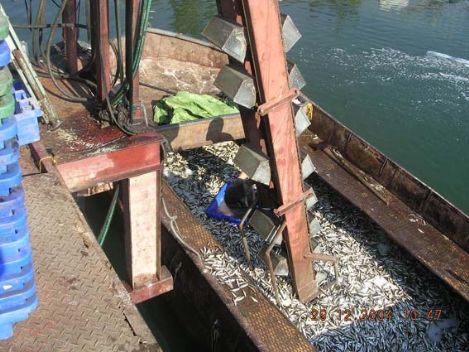Minister Simhon appealed to the Minister of Finance to allocate 15 million NIS for the implementation of the program and compensation for the fishermen

In his letter to Minister Steinitz, Simhon writes that from data collected by the Fisheries Division of the Ministry of Agriculture and Rural Development, it appears that the amount of fish in Lake Kinneret has decreased in the last decade, and especially in the last two years, by dozens of percent every year to a critical level. These data raise a real fear of an ecological disaster that will occur following the loss of the fishing resource in the Sea of Galilee and its transformation into a fishless lake.
According to Simhon, the fishing ban is required by reality in view of the public interest in maintaining a sustainable amount of fish in the Sea of Galilee, in order to maintain the ecological balance, and to provide the possibility of a fishing scope that will provide a reasonable livelihood for those involved in the industry in the years to come.
The Ministry of Agriculture is aware of the fact that the fishermen are expected to oppose the move. However, according to Simhon, it is not possible to stand idly by in the face of the collapse of the country's most important water reservoir. "The national responsibility requires taking significant steps that will ensure a sustainable ecological existence in the lake."
In order to minimize the damage to fishermen and reduce their resistance, a professional team, with the participation of representatives of the Ministry of Agriculture and Rural Development and the Ministry of Environmental Protection, put together a plan to support fishermen who make a living from the industry exclusively and continuously. The cost of the program, which will be spread over the entire period of shutdown, is approximately 15 million shekels (for the entire period), and it includes retirement redemption of approximately one third of the fishing fleet, monthly support for fishermen who will give up and are expected to return to activity at the end of the period, increased enforcement actions, proactive population of fish in the lake and research that will accompany the program . The plan is in line with the recommendations of the OECD's Fishing Grounds Committee for the management of sustainable fishing grounds.
Simhon intends to bring a resolution proposal to the government for the implementation of the program during the month of February, based on the opinion of the Minister of Environmental Protection and the Minister of Infrastructure.
An article on the ecological balance in the Kinneret on the Water Authority website
More on the subject on the science website

4 תגובות
The question of the fish and the Sea of Galilee (the Tiberian version of the question of the chicken and the egg):
What caused what?
Did the fish decrease because of the drop in the water level? Or her name...
Because of the decrease in the amount of fish...has the water level in the Sea of Galilee decreased?
In the dismal state of the Sea of Galilee, it seems to me that it would be better first of all to prohibit water pumping, and then discuss the issue of fishing...
Excellent, I hope the move will bear fruit.
There is a very large research potential in this process and I hope that research bodies that deal with aquaculture will take advantage of the new situation that has opened up.